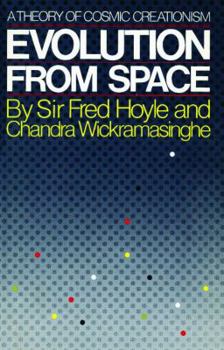Evolution from Space: A Theory of Cosmic Creationism
Select Format
Select Condition 
Book Overview
From Simon & Schuster, Evolution from Space is Sir Fred Hoyle and Chandra Wickramasinghe's theory of cosmic creationism in this daring and fascinating sequel to Lifecloud and Diseases from Space. Evolution from Space presents the revolutionary theory that mathematics can establish the probable existence of God and suggests that life began in space under the direction of a great intelligence.
Format:Paperback
Language:English
ISBN:0671492632
ISBN13:9780671492632
Release Date:January 1984
Publisher:Simon & Schuster
Length:192 Pages
Weight:0.64 lbs.
Dimensions:0.7" x 5.9" x 9.1"
Customer Reviews
2 ratings
Interesting fringe of science
Published by Thriftbooks.com User , 20 years ago
Astronomer and maverick Fred Hoyle is once reported to have said, 'Space isn't remote at all. ... It's only an hour's drive away if your car could go straight upwards.' Hoyle was a world-renowned astronomer, and a very creative scientist who didn't let convention or popular opinion sway his views. He is often credited with coining the term 'Big Bang', a bit ironic, given that he used this term in a bit of scorn -- he never accepted the Big Bang theory of universal creation and evolution, preferring a Steady State Theory, never fully developed, as the astronomical community as a whole was far more interested in the Big Bang theory. Hoyle's first claim to fame came from his work in stellar evolution and structure. He developed the theories of chemical element formation in the stars, commonly accepted by scientists today. Whenever you hear an astronomer or another waxing philosophic that we are all made of stardust or star-stuff, you are hearing an echo of Hoyle. While he did not win the Nobel Prize (many scientists think that he should have for this stellar work, no pun intended), he did with the Crafoord Prize, an award given by the Swedish Academy in recognition for fields not covered by Nobel Prizes. In collaboration with Chandra Wickramasinghe, Hoyle was a champion of the modern theory of panspermia. Panspermia is essentially the theory that life comes from off the earth -- it has developed into a theory entitled 'Cosmic Ancestry' now, and includes many more environmental ideas. It argues that the Earth is not a biologically closed ecosystem -- apart from the fact that human-made spacecraft have propelled genetical material beyond the earth notwithstanding, Panspermia and such theories argue that the universe has, indeed, may be full of spores and other types of genetic 'pieces', viruses and the like, that occasionally find their way to earth, and rarely but occasionally survive the entry and become grafted onto the genetic structures on Earth. This text with Wickramasinghe covers the range of ideas, including early theories from the late nineteenth century. Hoyle and Wickramasinghe also argue for an Anthropic Principle of Cosmology here -- that there is a purpose to the universe, and that human beings have a special place. Hoyle asks the question, why should we not believe there is a guiding principle in biology by intelligences beyond our own? Why is it that people are accepting of a God-principle, but not of intelligences that might fall between God and our own? These are rather dramatic and controversial ideas, to say the least. Hoyle and Wickramasinghe argue for a scientific pantheism, with God as the universe. Hoyle's ideas are interesting, and backed up with impressive science (chemistry, physics, and biology). However, it is still very cutting-edge and beyond the mainstream thinking -- Hoyle prods the more Darwinian theories for evidence, while accepting that there is in fact no more evidence for Panspermia. An i
A classic Darwin critique
Published by Thriftbooks.com User , 21 years ago
Noone realizes it but this work is a classic on the issue of Darwinism. It has been 'refuted' so many times and still survives one must wonder if it doesn't scare Darwinists. One doesn't have to accept their perspective to see that the statistical difficulties of the original Darwinian theory were fatal, and should have been seen all along. Attempts to deal with statistics in the Darwinian field have left a generation confused on the subject. The paradigm, to survive, has to keep the troops muddled.






